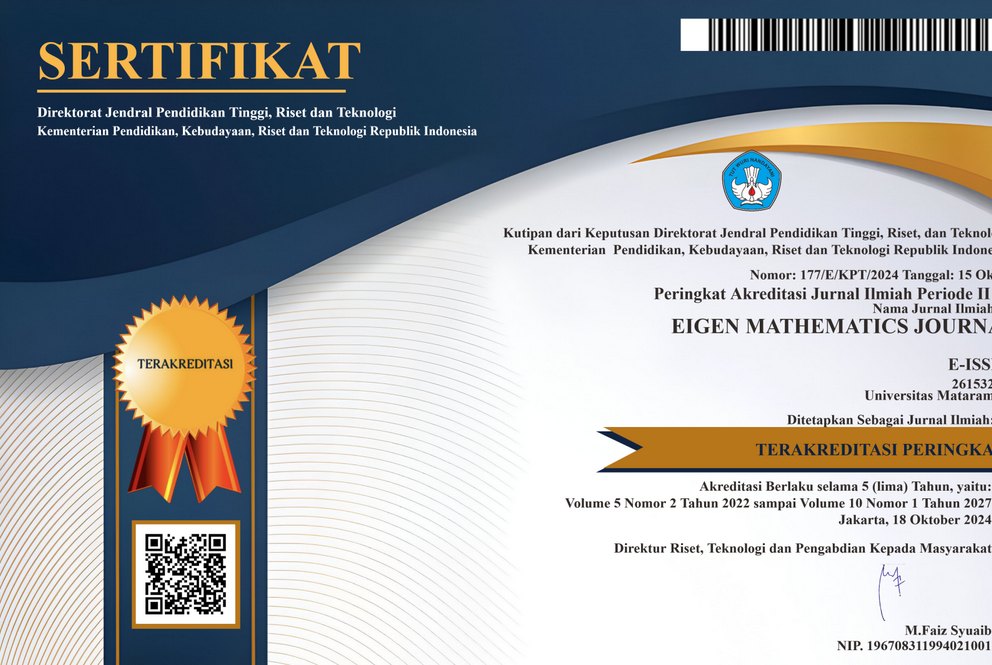Panel Data Regression Analysis of Human Development Index in West Nusa Tenggara Province with Fixed Effect Model
DOI:
https://doi.org/10.29303/emj.v4i2.114Keywords:
Cross Section, Intercept, Least Square Dummy Variable, Slope, Time SeriesAbstract
Humans are the true wealth of the nation. It is appropriate if humans become the main goal in development. Then the United Nations Development Program (UNDP) initiated the Human Development Index (HDI) as an indicator in measuring the progress of human development. Indonesia took part in applying the HDI calculation. Increasing the value of HDI from various provinces in Indonesia continues to be carried out, including in the Province of West Nusa Tenggara. Improving human development is based on an increase in all dimensions of the HDI itself. West Nusa Tenggara Province consists of 10 regencies/ cities. With different geographical, social, and economic backgrounds, the achievement of HDI in each region will vary. The purpose of this study was to determine the model of the HDI in West Nusa Tenggara Province in 2010-2017 using a fixed-effect model, which was used to see the influence of dimensions on the HDI and explain the differences in intercepts in each district/ city in West Nusa Tenggara Province. Based on the research conducted, a fixed effect panel data model on HDI was obtained for each district/ city in NTB in 2010-2017. From the HDI model obtained, it is known that the slope coefficient is constant, but the intercept varies throughout the district/ city. The slope coefficient value shows the magnitude of the influence of life expectancy, school duration, the average length of schooling, and expenditure per capita adjusted to the HDI of each district/ city.References
Badan Pusat Statistik. (2014). Berita Resmi Statistik: Indeks Pembangunan Manusia (IPM) Indonesia. Diakses melalui https://www.bps.go.id/ pada Mei, 2018.
Badan Pusat Statistik (2017). Berita Resmi Statistik: Indeks Pembangunan Manusia (IPM) Indonesia. Diakses melalui https://www.bps.go.id/ pada Mei, 2018.
Darnah. (2014). Multiple Linear Regression Analysis pada Data Ordinal yang telah di Transformasi dengan Methods of Succesive Interval. Jurnal Eksponensial, 1(5):102.
Draper, N. R. and Smith, H. (1998). Applied Regression Analysis, Third Edition. Canada: John Wiley & Sons, Ind.
Gianie (2009). Pengaruh Upah Minimum terhadap Penyerapan Tenaga Kerja Berpendidikan Rendah di Sektor Industri dan Perdagangan. Tesis (tidak dipublikasi), Program Studi Magister Perencanaan dan Kebijakan Publik Fakultas Ekonomi Universitas Indonesia.
Gujarati, D. N. (2004) Basic Econometrics, Fourth Edition. New York: The McGraw-Hill Companies.
Mas’udi. (2014). Pengaruh Komitmen dan Motivasi Berprestasi terhadap Kinerja Guru SMA Negeri 56 Jakarta. Jurnal MIX, 2(4) : 264.
Pangestika, S. (2015). Analisis Estimasi Model Regresi Data Panel dengan Pendekatan Common Effect Model (CEM), Fixed Effect Model (FEM) dan Random Effect Model (REM). Skripsi (tidak dipublikasi), Program Studi Matematika Fakultas MIPA Universitas Negeri Semarang.
Srihardianti, M., Mustafid, dan Alan, P. (2016). Metode Regresi Data Panel untuk Peramalan Konsumsi Energi di Indonesia. Jurnal Gaussian, 3(5) : 479.
Suyono. (2015). Analisis Regresi untuk Penelitian. Yogyakarta: CV. Budi Utama.
Wei, W. W. S. (2006). Time Series Analysis: Univariate and Multivariate Methods, Second Edition. USA: Pearson Education, Inc.
Downloads
Published
How to Cite
Issue
Section
License
All articles published in the Eigen Mathematics Journal will be available for free reading and downloading. The license applied to this journal is Creative Commons Attribution-Non-Commercial-Share Alike (CC BY-NC-SA).
Most read articles by the same author(s)
- Ni Luh Putu Dewi Wikayanti, Qurratul Aini, Nurul Fitriyani, Pengaruh Kurs Dolar Amerika Serikat, Inflasi, dan Tingkat Suku Bunga Terhadap Indeks Harga Saham Gabungan Dengan Vector Error Correction , EIGEN MATHEMATICS JOURNAL: Vol. 3 No. 1 Juni 2020
- Himayati Himayati, Ni Wayan Switrayni, Desy Komalasari, Nurul Fitriyani, Analisis Rotasi Ortogonal pada Teknik Analisis Faktor Menggunakan Metode Procrustes , EIGEN MATHEMATICS JOURNAL: Vol. 3 No. 1 Juni 2020
- Nirwana Nirwana, Mustika Hadijati, Nurul Fitriyani, Estimasi Parameter Model Moving Average Orde 1 Menggunakan Metode Momen dan Maximum Likelihood , EIGEN MATHEMATICS JOURNAL: Vol. 1 No. 1: Juni 2018
- Moudy Puspita Ayudhiah, Syamsul Bahri, Nurul Fitriyani, Peramalan Indeks Harga Konsumen Kota Mataram Menggunakan Vector Autoregressive Integrated Moving Average , EIGEN MATHEMATICS JOURNAL: Vol. 3 No. 1 Juni 2020
- Jusmawati Jusmawati, Mustika Hadijati, Nurul Fitriyani, Penerapan Model Vector Autoregressive Integrate Moving Average dalam Peramalan Laju Inflasi dan Suku Bunga di Indonesia , EIGEN MATHEMATICS JOURNAL: VOL. 3 NO. 2 DESEMBER 2020
- Deni Pratiwi, Lalu Abd Azis Mursy, Muhammad Rizaldi, Nurul Fitriyani, Regresi Nonparametrik Kernel Gaussian pada Pemodelan Angka Kelahiran Kasar di Provinsi Nusa Tenggara Barat , EIGEN MATHEMATICS JOURNAL: VOL. 3 NO. 2 DESEMBER 2020
- Bidayani Bidayani, Mustika Hadijati, Nurul Fitriyani, Model Regresi Semiparametrik Spline Hasil Produksi Padi di Kabupaten Lombok Timur , EIGEN MATHEMATICS JOURNAL: Vol. 2 No. 1 Juni 2019
- Ulfa Destiarina, Mustika Hadijati, Desy Komalasari, Nurul Fitriyani, Estimasi Parameter Distribusi Mixture Eksponensial dan Weibull dengan Metode Bayesian Markov Chain Monte Carlo , EIGEN MATHEMATICS JOURNAL: Vol. 2 No. 1 Juni 2019
- Ena Setiawana, Nurul Fitriyani, Lisa Harsyiah, Modeling the Open Unemployment Rate in Indonesia Using Panel Data Regression Analysis , EIGEN MATHEMATICS JOURNAL: Vol. 7 No. 1 (2024): June
- Baiq Urfa Justitiaski, Nurul Fitriyani, Syamsul Bahri, Modeling the Number of Infant Mortality in East Lombok using Geographically Weighted Poisson Regression , EIGEN MATHEMATICS JOURNAL: Vol. 5 No. 2 Desember 2022






